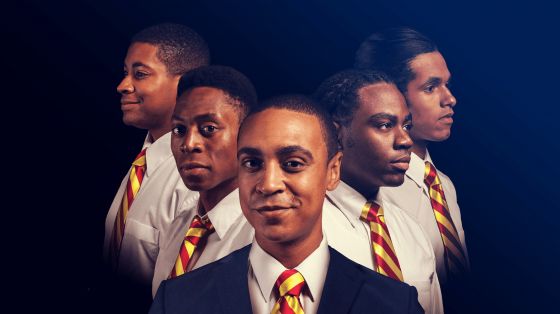
There are probably hundreds of private schools throughout our nation where young men complete their educations with no life-altering incident, but you won't find them in fiction. The premise of culturally unruly and hormone-racked adolescents confined within a unigender environment charged with indoctrinating them in the virtues (or pragmatics, anyway) of ethical discipline presents dramatic potential too irresistible to ignore. What distinguishes the lads of the Charles R. Drew Prep School For Boys from their counterparts at Groton or Gonzaga is, first, that the five whom we meet are all African-American and, second, that their chief extracurricular activity revolves, not around sports, but music—specifically, the gospel choir cherished by nearly a half-century of Drew alumni. The loyalties in this band of brothers are divided between Bobby Marrow, the headmaster's rebellious nephew, and Pharus Young, an immensely talented and proudly gay scholarship student not above flaunting his excellence. Anthony "AJ" James, the latter's het roommate, tolerates these caprices with fraternal patience, as does Junior Davis, the former's sidekick, while loner David Heard sequesters himself within his call to the ministry. Headmaster Marrow and guest instructor Pendleton offer what counsel they can, but even adults endowed with experience and wisdom are not without their blind spots. Given the absence of foreshadowed tropes evidenced in Tarell Alvin McCraney's universe, the warblers' propensity for expressing themselves through their concert repertoire becomes a valuable aid to our comprehension of the collective zeitgeist and the occasional individual unease as well. McCraney's soliloquies in Choir Boy encompass folk lamentations like "Motherless Child" or country hymns like "Trust and Obey." This last selection serves as the invocation for Drew academy's commencement exercises, its affirmation of faith displaying an ironic edge after a secular tune (Skip Scarborough's "Never Been So Much In Love") intrudes to further disturb the placid surface of a feigned unity. The chorale selections are performed by an adroit cast exhibiting crystalline a cappella harmonies under the vocal tutelage of Frederick Harris and choreography of Breon Arzell. This doesn't mean that playgoers are to wallow in mindless reverie as they would at a musical, however. No matter whose side we take in professor Pendleton's class discussion regarding the slave origins of the songs now called "spirituals," the palliative power of these prayers for deliverance from suffering demand our attention.
